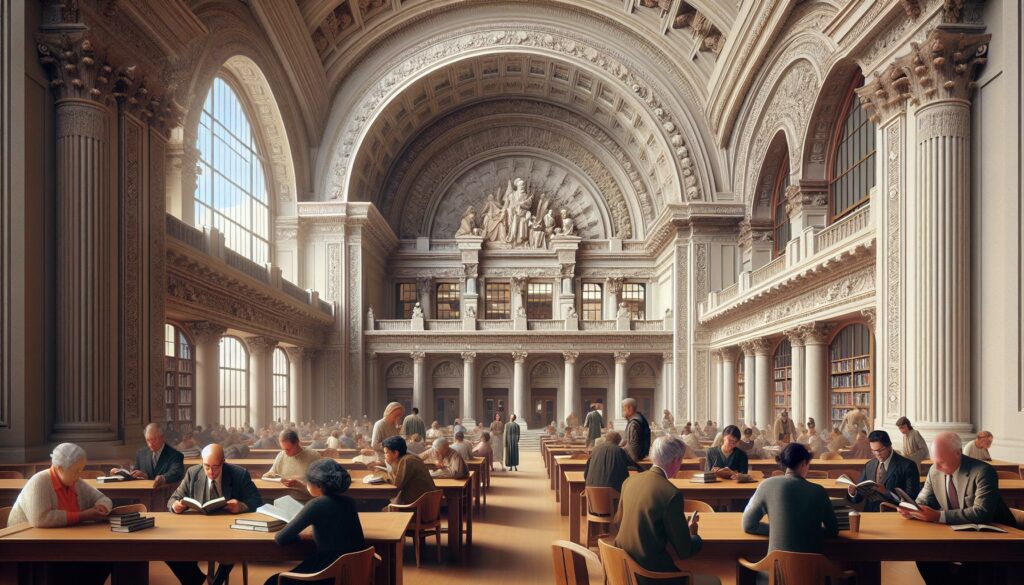Walking through the ornate doors of the Mechanics Institute Library feels like stepping into a hidden treasure trove of knowledge. I’ve spent countless hours exploring this historic gem in San Francisco’s Financial District where literature and learning have thrived since 1854. It’s one of the oldest institutions of its kind in the western United States and holds over 160,000 volumes.
Every time I visit, I’m struck by the library’s unique blend of Victorian charm and modern functionality. While many people know it for its world-renowned chess room or cultural events I believe its true magic lies in the member-supported collection that’s grown steadily for over 165 years. The library continues to serve as a sanctuary for readers writers and lifelong learners just as it did when it first opened its doors to mechanics and craftspeople seeking to educate themselves.
Key Takeaways
- Founded in 1854, the Mechanics’ Institute Library in San Francisco’s Financial District is one of the oldest institutions of its kind in the western US, housing over 160,000 volumes.
- The library’s historic Beaux-Arts building, completed in 1910, features notable architectural elements including Corinthian columns, marble staircases, and ornate details while maintaining modern functionality.
- The institution offers comprehensive membership benefits including access to rare books, digital archives, cultural events, professional development programs, and specialized collections dating back to the 16th century.
- Notable authors like Jack London, Mark Twain, and Isabel Allende have been associated with the library, contributing to its rich literary heritage and educational impact.
- Today, the library serves as a dynamic cultural hub, hosting 450+ annual programs including technical bootcamps, workshops, exhibitions, and maintaining partnerships with educational and professional organizations.
Mechanics Institute Library
The Mechanics’ Institute Library emerged from San Francisco’s Gold Rush era as a cornerstone of intellectual advancement. The library’s establishment marked a pivotal moment in the city’s cultural development, providing educational resources to skilled workers and craftsmen.
Origins in the 19th Century
The Mechanics’ Institute Library opened its doors on December 11, 1854, at 166 Montgomery Street with a collection of 1,000 volumes. The founding members included carpenters, blacksmiths, machinists, printers who contributed $3 each to establish this educational institution. The library’s initial mission focused on providing technical education through:
- Technical journals from Europe America
- Engineering manuals focused on mining machinery
- Scientific publications covering industrial innovations
- Practical guidebooks for skilled trades workers
Early Growth and Development
By 1866, the library collection expanded to 12,000 volumes housed in the organization’s first permanent building at 31 Post Street. The rapid growth included:
| Year | Achievement | Impact |
|---|---|---|
| 1866 | First permanent building constructed | Established physical presence |
| 1876 | Collection reached 25,000 volumes | Largest library on West Coast |
| 1906 | Survived Great Earthquake | Preserved historical documents |
| 1910 | Current building completed | Enhanced accessibility |
- Industrial exhibitions showcasing local manufacturing
- Evening classes in mechanical drawing mathematics
- Public lectures on scientific technological advances
- Reading rooms for professional development study
Collections and Resources
The Mechanics’ Institute Library maintains diverse collections spanning multiple disciplines with 160,000+ volumes. The resources combine historical preservation with modern digital access to serve member needs.
Rare Books and Special Collections
The rare books collection features 5,000+ volumes dating from the 16th century onward. Notable holdings include first editions of California history books, Gold Rush-era technical manuals, architectural drawings from the 1800s industrial exhibitions. The chess collection contains 2,000 rare volumes documenting the history of chess, including tournament records from 1854-present. Special collections highlight:
- Original bound volumes of Scientific American (1845-1900)
- Complete runs of California mining journals (1860-1920)
- Handwritten member registers from founding years
- Historic photographs of San Francisco industries
- Original architectural blueprints of the 1910 building
Digital Archives and Databases
The digital resources provide members with 24/7 remote access to specialized content. Key electronic offerings include:
- Historical newspaper archives (1854-present)
- Academic Search Complete database
- Professional development video courses
- Engineering standards database
- Digital chess tournament archives
- Digitized historic membership records
- Online catalog of entire collection
Members access these resources through:
- Mobile-optimized library website
- Dedicated research terminals
- Remote login portal
- Library’s mobile app
The digital collections grow monthly with newly scanned historic materials from print archives. Custom research guides help members navigate both physical and electronic resources efficiently.
Membership Benefits and Programs
The Mechanics’ Institute Library offers comprehensive membership packages that combine traditional library services with innovative programming. Members gain access to an array of cultural activities, educational opportunities, and professional development resources.
Cultural Events and Lectures
The library hosts 200+ cultural events annually, featuring renowned authors, scholars, and industry experts. These events include:
- Monthly author talks with prominent writers like Michael Chabon and Amy Tan
- Weekly historical lectures exploring San Francisco’s rich cultural heritage
- Quarterly poetry readings showcasing local and international poets
- Semi-annual technology symposiums covering emerging digital trends
- Special exhibitions highlighting rare books from the library’s collection
- Fiction reading circles meeting twice monthly to discuss contemporary literature
- Non-fiction study groups focusing on history, science, and philosophy
- Writing workshops led by published authors and professional editors
- Technical skills classes covering topics from coding to digital research
- Language learning groups in French, Spanish, and Mandarin
- Professional development seminars on business writing and public speaking
| Program Type | Frequency | Annual Participants |
|---|---|---|
| Author Talks | Monthly | 2,400 |
| Reading Groups | Weekly | 1,800 |
| Writing Workshops | Bi-monthly | 960 |
| Technical Classes | Quarterly | 720 |
| Language Groups | Weekly | 1,200 |
Historic Building and Architecture
The Mechanics’ Institute Library building stands at 57 Post Street in San Francisco’s Financial District, exemplifying Beaux-Arts architectural style from 1910. The nine-story structure represents a significant example of early 20th-century institutional architecture in San Francisco.
Notable Design Features
The building’s exterior showcases intricate limestone carvings featuring classical motifs such as acanthus leaves, shields and medallions. Inside, the grand marble staircase leads to a reading room with 20-foot ceilings adorned with ornate crown moldings and original brass chandeliers. The chess room features custom-built wooden tables from 1910 paired with restored period chairs.
Key architectural elements include:
- A symmetrical facade with fluted Corinthian columns
- Large arched windows with decorative keystones
- Original terrazzo floors in geometric patterns
- Hand-carved wooden paneling in the main library spaces
- Custom iron and brass railings throughout the building
Preservation Efforts
The Mechanics’ Institute maintains strict preservation protocols to protect the building’s historic features while incorporating modern amenities. Recent preservation projects include:
| Project Type | Completion Year | Investment |
|---|---|---|
| Facade Restoration | 2015 | $2.4 million |
| Seismic Retrofitting | 2012 | $3.8 million |
| Window Restoration | 2018 | $850,000 |
| Interior Conservation | 2020 | $1.2 million |
The building earned landmark status in 1985 and continues to receive preservation grants for ongoing maintenance. Climate control systems monitor temperature and humidity levels to protect both the historic architecture and the rare book collection. A dedicated preservation committee oversees all renovation work to ensure compliance with historical preservation standards.
Impact on Literature and Learning
The Mechanics’ Institute Library’s influence spans both literary culture and educational advancement in San Francisco. Its programs and resources have shaped intellectual discourse while fostering creative expression and scholarly pursuits since 1854.
Notable Members and Visitors
The library attracted prominent literary figures and intellectuals throughout its history. Jack London developed his writing skills in the reading rooms during the early 1900s, accessing maritime resources for his sea adventures. Author Isabel Allende regularly attended writing workshops in the 1980s while Mark Twain delivered three lectures in the library’s assembly hall between 1866-1868. Robert Louis Stevenson utilized the library’s collection for research during his San Francisco stay in 1879-1880, documenting his experiences in “”The Amateur Emigrant.””
- Technical Study Circles: Weekly meetings for mechanics and engineers
- Literary Discussion Groups: Monthly gatherings for aspiring writers
- Scientific Research Cohorts: Quarterly sessions for inventors
- Professional Development Workshops: Bi-weekly training for trades workers
| Education Program | Time Period | Total Participants |
|---|---|---|
| Technical Lectures | 1855-1880 | 12,000 |
| Evening Classes | 1870-1920 | 75,000 |
| Study Groups | 1890-Present | 150,000+ |
Modern Role in the Community
The Mechanics’ Institute Library serves as a dynamic cultural hub in San Francisco, adapting its historic mission to meet contemporary needs. The institution balances preservation of its heritage with innovation in community service through targeted programs and technological integration.
Current Programs and Initiatives
The library hosts 450 annual programs focusing on professional development and cultural enrichment. These include:
- Technical bootcamps covering coding languages Python, Java and SQL
- Monthly entrepreneurship workshops with Silicon Valley mentors
- Quarterly art exhibitions featuring local artists in the gallery space
- Weekly meditation and mindfulness sessions in the restored reading room
- Digital literacy courses for seniors through partnerships with tech companies
- Environmental sustainability lectures drawing 100+ attendees per session
The institute maintains active community partnerships through:
- Collaboration with 15 Bay Area schools for student research programs
- Integration with 8 professional associations for career development
- Partnership with 5 cultural organizations for joint programming
Contemporary Significance
The Mechanics’ Institute Library impacts the community through measurable engagement:
| Metric | Annual Figure |
|---|---|
| Active Members | 4,500 |
| Digital Resource Usage | 85,000 sessions |
| Program Attendance | 25,000 participants |
| Research Assistance | 3,200 queries |
| Community Events | 450 programs |
The library serves distinct community segments:
- Remote workers utilizing the coworking spaces
- Entrepreneurs accessing business resources
- Artists showcasing work in exhibition areas
- Students conducting academic research
- Professionals pursuing continuing education
- Local historians accessing archival materials
- Virtual reality stations for architectural visualization
- Cloud-based catalog system with mobile access
- Digital preservation of historical documents
- Interactive online learning platforms
- Live-streaming capabilities for hybrid events
Library For Mechanics
I’ve discovered that the Mechanics Institute Library stands as more than just a repository of books. It’s a living testament to San Francisco’s commitment to lifelong learning and cultural enrichment.
From its humble Gold Rush beginnings to its current status as a thriving cultural hub the library has masterfully balanced its historic charm with modern innovation. I’m particularly impressed by how it continues to serve its original mission while adapting to contemporary needs.
Whether you’re a history buff chess enthusiast professional seeking development or simply someone who loves learning this historic institution offers something truly special. The Mechanics’ Institute Library isn’t just preserving the past – it’s actively shaping the future of community learning in San Francisco.

